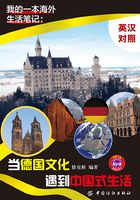
New Words and Expressions
1.academy[ə'kædəmi]n.研究院,学会
2.indivisibility[,ɪndɪ,vɪzə'bɪIətɪ]n.不可分割
3.accordingly[ə'kɔ:diŋIi]adv.因此,所以
4.not only……but also……不仅……而且……
5.engage in 参加;从事;忙于
6.argumentation[,ɑːgjumen'teiʃən]n.论证,论点,
7.seminar['seminɑ:]n.(大学)研究班,研究班讨论会[课程]
8.theoretical[,θiə'retikəI]adj.理论的
9.extensive[iks'tensiv]adj.广阔的,广泛的;大量的,大规模的
10.dropping out 辍学
11.comparability[,kɔmpərə'biIiti]n.相似性,可比较性
12.fundamental[,fʌndə'mentəI]adj.基本的;重要的,
13.presentation[,prezən'teiʃən]n.报告
II
“Would you like to tell me the ranks of German Universittes?”asks Wang Chenxin.
It's a pleasure. According to the latest ranking of the German Research Foundation(Deutsche Forschungsgemeinschaft),the top 10 universities in Germany are:Heidelberg University, Munich University, Munich Technical University, Aachen Technical University, Tübingen University, Berlin Free University, Freiburg University, Würzburg University, Karlsruhe Technical University and Bremen University.The oldest university in Germany is Heidelberg University(founded in 1386).
Universities of applied sciences(Fachhochschule)are characterized by a more practtcal orientatton and a much shorter study time(about three years).They have only a very short traditton to look back on and were ffrst established in the 1960s and 70s.Nevertheless, they have enjoyed a rapid increase in popularity and a quarter of all students now decide to begin their higher education career there.What attracts so many students to them is that they are able to offer a shorter route to the desired profession by a more ttght organizatton of degree courses, teaching in small groups and more practice-oriented studies.Labor market opportunities for graduates also tend to be better than for university graduates who have studied similar courses.Offen, universittes of applied sciences are more closely connected with the regional industry and do a lot of research for and in cooperation with local companies.The range of subjects though is more limited than at universittes and is usually centered around engineering, business administration or computer science.Upon graduation, a University of Applied Sciences Diploma is awarded(Diplom FH).Recently, B.A.and partly also M.A.degree programs have also been introduced,says Li Yucui.
“How about the international students in Germany?”asks Wang Chenxin.
“About two million students around the world decide to attend a university abroad.More than one tenth of those students decide to go to Germany.Currently, there are about 240,000 foreign students enrolled at all kinds of instttuttons of higher educatton in Germany and the largest group actually comes from China(about 30,000).The main reasons for so many foreign students to choose Germany as their preferred study desttnatton are the good quality of German education and the absence of or the comparatively cheap tuitton fees.Another important factor is the importance of German as the most commonly spoken language in the European Union(100 million nattve speakers)and as the second most widely used scienttffc language(18%of all books worldwide are published in German).Germany is also located in the heart of Europe and thus the perfect place to learn more about European culture.”
Almost all German universittes now also offer internattonally-oriented B.A.and M.A.degree courses taught in English for those who do not have enough ttme to learn German in advance.German language courses can then be attended parallel to your studies.Possible subjects range from‘Aeronautical and Astronauttcal Technology’at the University of Applied Sciences in Aachen to‘World Heritage Studies’at the Technical University in Cottbus.There are also more than 150 so-called European degree courses, in which students spend at least two semesters at the respecttve European partner university and are then able to obtain a double degree from both the German and the partner university at the end of their studies,says Li Yucui.
“Please tell me the admission requirements for Chinese students,”asks Wang Chenxin.
“Hold on!I will tell you when I come back,”says Li Yucui.
二
王晨馨问李玉翠:“谈谈德国大学的排名好吗?”
李玉翠答:“好的!根据最新德国研究基金排名(Deutsche Forschungsgemeinschaft),前10名德国大学是:海德堡大学(Heidelberg University)、慕尼黑大学(Munich University)、慕尼黑技术大学(Munich Technical University)、亚琛工业大学(Technical University)、图宾根大学(Tübingen University)、柏林自由大学(Berlin Free University)弗雷堡大学(Freiburg University)、维尔茨堡大学(Würzburg University)、卡尔斯鲁厄技术大学(Karlsruhe Technical University)和不莱梅大学(Bremen University)。德国历史最悠久的大学是海德堡大学(Heidelberg University)(建于1386年)。”
“应用技术学院(Fachhochschule)的特点是应用,学习时间要短得多(大约3年)。这些大学的历史非常短,在上世纪60到70年代建立。然而,他们却名声鹊起、生源快速增长。现在德国四分之一的学生选择这里开始他们的高等教育。吸引那么多学生来就读的原因是,通过更严密的学位课程组织、小班教学和更多的学习实践,向学生们提供一条通往理想职业的捷径。和学习相似课程的大学毕业生比起来,他们的就业前景更好。应用技术学院通常和地方产业紧密联系,为当地的公司做许多研究项目,进行许多合作。和大学相比,其学科范围受到较多限制,通常围绕着工程、企业管理、或者计算机科学。毕业时获得应用技术学院文凭(Diplom FH)。最近也开设了学士和硕士课程。”
王晨馨又问:“谈点儿德国留学生的情况,好吗?”
李玉翠说:“世界约两百万学生决定出国留学,这些学生中十分之一多选择来德国学习,德国各高等院校招收得外国学生数量通常大约达到240,000名,其中,中国留学生的比例最大(约3万名)。那么多外国学生选择德国作为他们的学习目的地的主要原因是德国的优质教育,没有学费或者学费比较低。另外一个重要因素是德语的重要地位,欧盟中说德语的人最多(1亿人),世界科学界德语使用的广泛程度排第二位,(世界范围内用德语出版的书籍占所有书籍的18%),德国处在欧洲的中心地带,因此是学习更多欧洲文化的最佳地点。”
“几乎所有的德国大学目前都向那些没有足够时间预先学好德语的学生提供用英语授课的国际性学士学位和硕士学位课程,并且可以同步学习德语课程。可选课程范围从亚琛应用科学大学提供的‘航空航天技术’,到在科特布斯的技术大学提供的‘世界遗产研究’课程。还有150多个所谓的欧洲学位课程,其中,学生至少花两个学期在相应的欧洲合作大学学习,学业完成时可以获得德国和合作大学的双学位。”
王晨馨问:“谈谈对中国学生的入学要求好吗?”
李玉翠说:“别挂!我去去就来。”